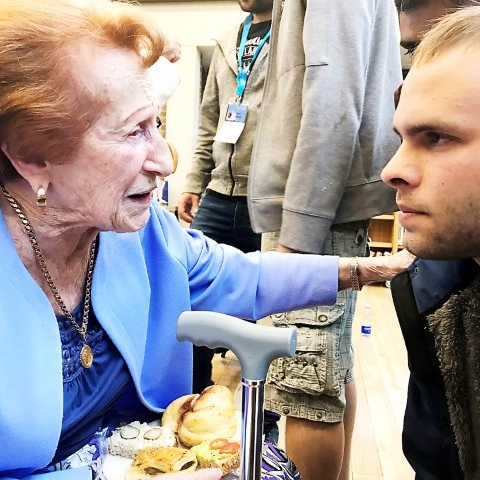
News

Holocaust survivors and IDF soldiers share their past experiences
NICOLA MILTZ
Members of Achim L’Chaim, or Brothers for Life – an organisation that supports injured Israel Defence Forces (IDF) soldiers – met with a few of South Africa’s last remaining survivors at the Johannesburg Holocaust & Genocide Centre.
It was a moving coming together of kindred spirits, whose life experiences have connected them in a shared bond that goes beyond words.
“You are my hero,” said soldier Netanel Lulay. “It is because of you that I serve in the IDF – so that the Holocaust will never happen again.”
One by one each soldier – all of whom had been injured in combat – introduced himself to the survivors, who were visibly moved by their presence.
In her welcoming address, the Holocaust centre’s Karyn Kadish said: “We are privileged to be in the presence of these incredible men and women who survived the atrocities of the Shoah… together with our generation of Jewish defenders who safeguard our homeland and protect all Jews in the diaspora.”
Veronica Phillips, 91, retold her experiences at the hands of the Nazis when she was a young girl in Budapest, Hungary. “My entire family, except for my brother and mother, were annihilated. My two cousins were shot in front of our very eyes and I suffered eight miscarriages after torturous treatment in Ravensbrück concentration camp.”
It was one year before liberation in March 1944 when her family was marched to the concentration camps.
“As these memories flood back in my mind’s eye, I ask myself: ‘Why did I survive? How did I survive? Who am I… I am Veronica Phillips, a geneticist, a scientist, one of the last remaining survivors of the Ravensbrück concentration camp.”
She said: “I lived in a luxurious apartment. My grandmother lived with us. We kept a kosher home and the wonderful ruach of the Shabbos was brought into our home. That beautiful picture of family always overpowers the images which are there in my rear-view mirror.”
Phillips described herself as a bright child who loved school, but all this changed when the words “Jews are rats” were written on the blackboard.
In a harrowing account of the night she was taken to the concentration camp, she said: “Pushed into cattle cars, no room to sit or lie, we stood one against the other unable to move, not even our arms. There was no food, no water and no toilets… We heard the dogs barking and growling. The SS men were shouting: ‘Shnell, shnell.’”
Phillips recalled the infestation of lice: “I remember scratching, scratching an itch I can never forget.”
When they were given food, it was a rotten sweet potato soup that “poured out of guts into toilet holes in the ground”. She said the “smell of putrified bodies” would linger forever.
Phillips narrowly escaped the gas chambers because she could speak German and was needed to work in a nearby factory.
At the end of the war, she was somehow reunited with the only two surviving members of her family: her mother and brother. When her beloved brother was offered work in South Africa, she naturally followed him.
She dedicated her life to education, lecturing in genetics at the University of the Witwatersrand. While she realises the importance of education, Phillips admits to being “suspicious of education” as well, having seen “what no man should witness: gas chambers built by learned engineers, children poisoned by educated physicians, infants killed by trained nurses”.
She called on educators to “help your students to become human. Your efforts must never produce learned monsters, skilled psychopaths, educated Eichmen [a tacit reference to Nazi war criminal Adolf Eichmann]. Reading, writing and maths are important only if they serve to make our children more human from generation to generation.”
The Brothers for Life guests, all of whom were hosted by Johannesburg families, presented each survivor with a special coin with the inscription “brotherhood, courage and sacrifice”.
Kadish said the IDF soldiers had the enormous responsibility of carrying “the torch of remembrance” of the survivors of the Shoah, and of passing this torch “on to future generations” by protecting the existence and security of the State of Israel.




